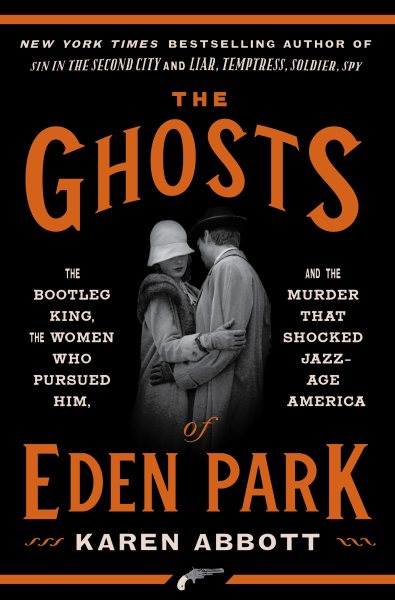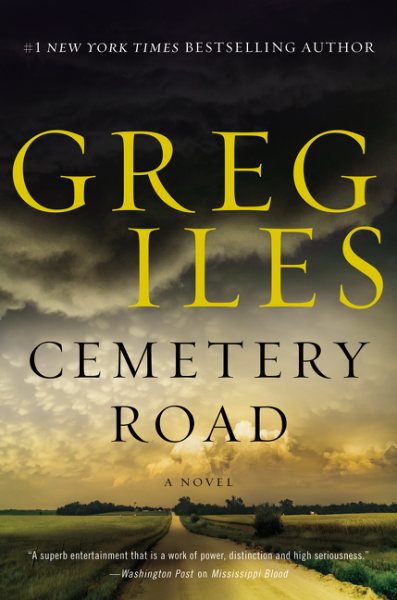By Patrick O’Daniel. Special to the Clarion-Ledger Sunday print edition (August 11)
 Karen Abbott expertly weaves a story of ambition, treachery, and revenge in her new book The Ghosts of Eden Park: The Bootleg King, the Women Who Pursued Him, and the Murder That Shocked Jazz-Age America. Drawing from court testimonies, newspapers, and other first-hand accounts, Abbott details the rise and fall George Remus, the so-called “King of the Bootleggers.”
Karen Abbott expertly weaves a story of ambition, treachery, and revenge in her new book The Ghosts of Eden Park: The Bootleg King, the Women Who Pursued Him, and the Murder That Shocked Jazz-Age America. Drawing from court testimonies, newspapers, and other first-hand accounts, Abbott details the rise and fall George Remus, the so-called “King of the Bootleggers.”
The Eighteenth Amendment to the US Constitution banned the sale and transportation of most alcoholic beverages in the United States. George Remus, a successful defense attorney in the Midwest, represented many bootleggers arrested for violating the law. He was amazed at how easily his clients paid exorbitant court costs and fines. Intrigued by the profit potential in bootlegging, he studied the prohibition law, discovered its loopholes, and found a way to cash in on the liquor business.
Remus found that millions of gallons of liquor remained in bonded warehouses after prohibition went into effect. The only way the owners could legally get rid of it was to sell their stock to drug companies who in turn sold the liquor as prescription medicine. Remus saw an opportunity and decided to buy both distilleries and drug companies to become both buyer and seller.
Remus falsified or destroyed records of shipments, and had crews from his trucking company divert liquor to a fortified safe-house in rural Ohio where they sold it illegally. Remus bribed law enforcement to avoid arrest as he bought more distilleries, warehouses, and pharmacies. He lived a lavish lifestyle reminiscent of Fitzgerald’s Jay Gatsby and made millions at a time when the average salary was less than $2000 per year.
Abbott goes into detail about Remus’s business operations and the men that worked for him. She recounts the hijacking that led Remus to use armed convoys and a fortified safe-house. She describes how easily a rich bootlegger could corrupt poorly paid law enforcement and how hard it was for honest prohibition agents to do their jobs. On one occasion, Remus’s lieutenant George Conners expertly cajoled a couple of prohibition agents with whiskey and money after the two nearly discovered the operation. Every decision described sheds more light on Remus’s character.
Abbott also brings to light Mabel Walker Willebrandt, the crusading Assistant Attorney General who wanted Remus behind bars. The story takes a bizarre turn when Agent Frank Dodge, the man Willebrandt sent to investigate Remus, and Remus’s wife Imogene became lovers and conspired to steal his fortune. Their treachery would not only bring about Remus’s ruin but their own as well.
Abbott’s colorful settings and intricate relationships make the book read like a novel, but always with an eye on historical accuracy. She inserts excerpts of court testimony as epigraphs to set the stage as events unfold. Eyewitnesses recount personal observations, motivations, and secret plots. The details help the reader see the conspiracies take shape against Remus, his downfall, and what brought him to seek revenge.
Abbott captures the feel of the Jazz Age and its gangsters, scofflaws, and crusaders in this story. The Ghosts of Eden Park is a well-researched and highly engaging work filled with intrigue, infidelity, murder, and headline-catching courtroom drama. This book is a must-read for anyone interested in the Prohibition Era, including fans of Prohibition by Ken Burns and Lynn Novick and HBO’s Boardwalk Empire.
Patrick O’Daniel is the Executive Director of Libraries for Southwest Tennessee Community College in Memphis and author of Crusaders, Gangsters, and Whiskey: Prohibition in Memphis, When the Levee Breaks: Memphis and the Mississippi Valley Flood of 1927, Memphis and the Super Flood of 1937: High Water Blues, and co-author of Historic Photos of Memphis.
Lemuria has chosen The Ghosts of Eden Park as its August 2019 selection for its First Editions Club for Nonfiction. Signed first editions are available in store and on our website.


 In the interest of full disclosure, let me state that I know Rick Gruber, and I know him to be a scholar of the first order who has at his command more information about art of a southern nature than anyone alive. It is also worth noting that his prose is infinitely readable, unlike so many of those who write about art in a scholarly fashion.
In the interest of full disclosure, let me state that I know Rick Gruber, and I know him to be a scholar of the first order who has at his command more information about art of a southern nature than anyone alive. It is also worth noting that his prose is infinitely readable, unlike so many of those who write about art in a scholarly fashion.
 In
In  One summer in my twenties I worked as a deckhand on the Greenville, a towboat that plied the upper Mississippi River from Alton, Illinois to Davenport, Iowa. In that short span of time I came to understand the tremendous power of the river and the importance of its commerce. Melody Golding’s superb book,
One summer in my twenties I worked as a deckhand on the Greenville, a towboat that plied the upper Mississippi River from Alton, Illinois to Davenport, Iowa. In that short span of time I came to understand the tremendous power of the river and the importance of its commerce. Melody Golding’s superb book,  His newest,
His newest,  “I don’t know how many people were kidnapped in Mississippi in 1968, but I was one of them,” writes author Lovejoy Boteler in the first sentence of the
“I don’t know how many people were kidnapped in Mississippi in 1968, but I was one of them,” writes author Lovejoy Boteler in the first sentence of the  Well, the season is upon us: hundreds of hungry children dressing up like princesses and superheroes, anticipating candy by the truckload. But my treat came early in the form of John M. Floyd’s seventh exciting collection of mystery short stories.
Well, the season is upon us: hundreds of hungry children dressing up like princesses and superheroes, anticipating candy by the truckload. But my treat came early in the form of John M. Floyd’s seventh exciting collection of mystery short stories.  But in
But in  Gravesend is a glum, gritty, depressing place on the wrong side of the Brooklyn tracks—but it’s also an old, close-knit neighborhood with a small-town feel, where everyone knows everyone else and everyone else’s business.
Gravesend is a glum, gritty, depressing place on the wrong side of the Brooklyn tracks—but it’s also an old, close-knit neighborhood with a small-town feel, where everyone knows everyone else and everyone else’s business. Few books could justifiably be called game-changers, but Brother to a Dragonfly was one for me when I first read it in college. It covers his formative years through the height of the civil rights movement as he became, in his words, a self-satisfied white southern liberal. You meet those, like his grandfather, the son of a Confederate soldier, who introduced him to the idea of nonviolence. From the first sentence to the last, you get to know Joe, the titular protagonist who was troubled but was ever the supportive critic, constantly pushing Will to truly evaluate his motives within the movement.
Few books could justifiably be called game-changers, but Brother to a Dragonfly was one for me when I first read it in college. It covers his formative years through the height of the civil rights movement as he became, in his words, a self-satisfied white southern liberal. You meet those, like his grandfather, the son of a Confederate soldier, who introduced him to the idea of nonviolence. From the first sentence to the last, you get to know Joe, the titular protagonist who was troubled but was ever the supportive critic, constantly pushing Will to truly evaluate his motives within the movement. Forty Acres and a Goat is a companion memoir that develops on the lessons from Brother to a Dragonfly and extends them in time as he returned to a rural home, this time to a farm outside of Nashville, Tennessee. We meet Jackson, the goat and gatekeeper to the draft-dodgers and other non-conformists who visited or found refuge in the Campbells’ company.
Forty Acres and a Goat is a companion memoir that develops on the lessons from Brother to a Dragonfly and extends them in time as he returned to a rural home, this time to a farm outside of Nashville, Tennessee. We meet Jackson, the goat and gatekeeper to the draft-dodgers and other non-conformists who visited or found refuge in the Campbells’ company.